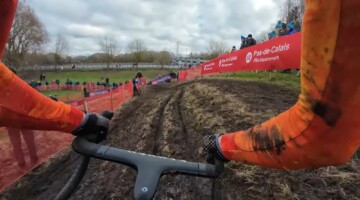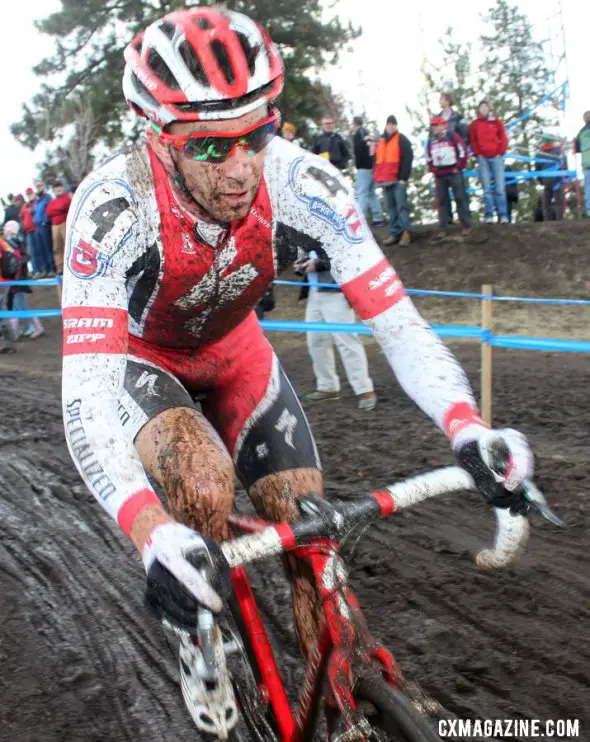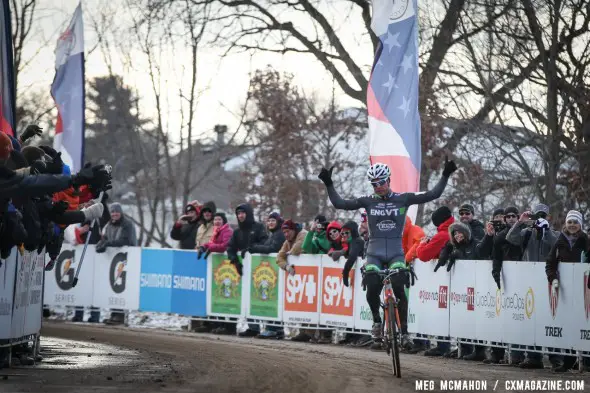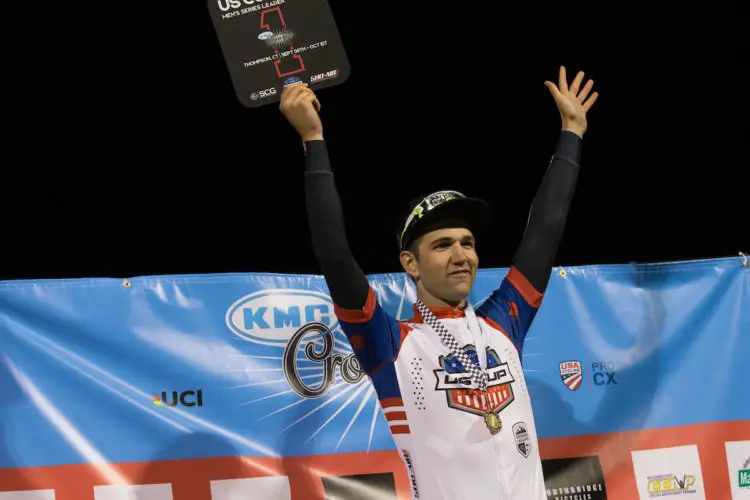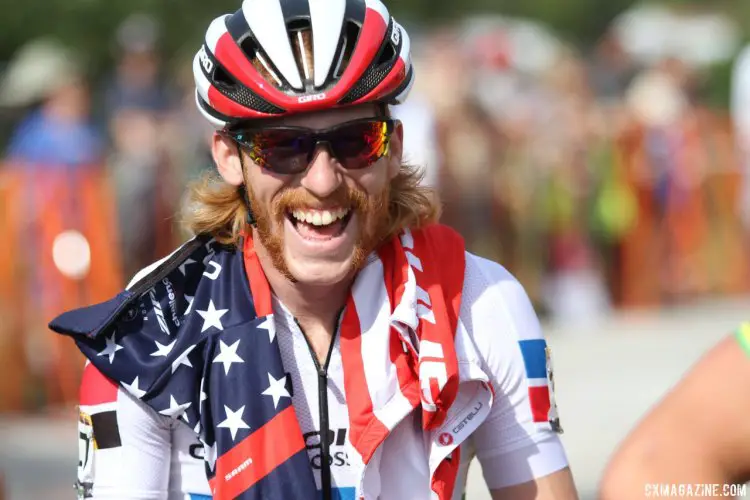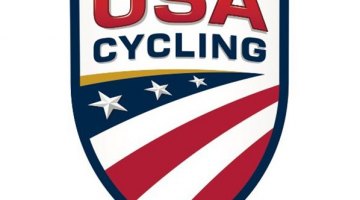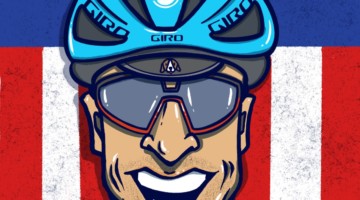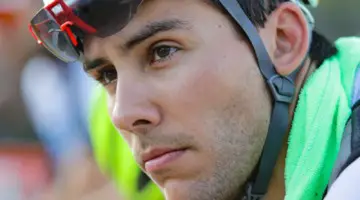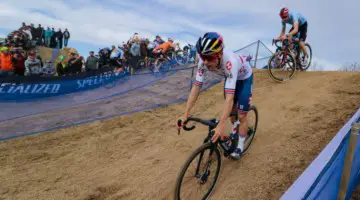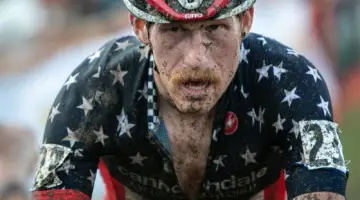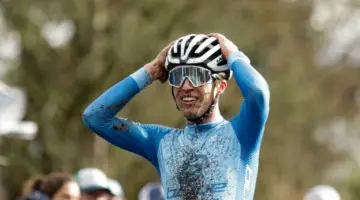The first month of the cyclocross season in the U.S. has provided a little bit of everything. There has been domestic racing out east at Rochester and the KMC Cross Fest, out west at CrossVegas and the West Sacramento GP and two chances for U.S. riders to square off against at Jingle Cross at the Trek CX Cup in the Midwest.
The Men’s results thus far have provided a little bit of everything as well. Five different U.S. racers have won races from coast to coast, and a number of riders have acquitted themselves well against the top Europeans.
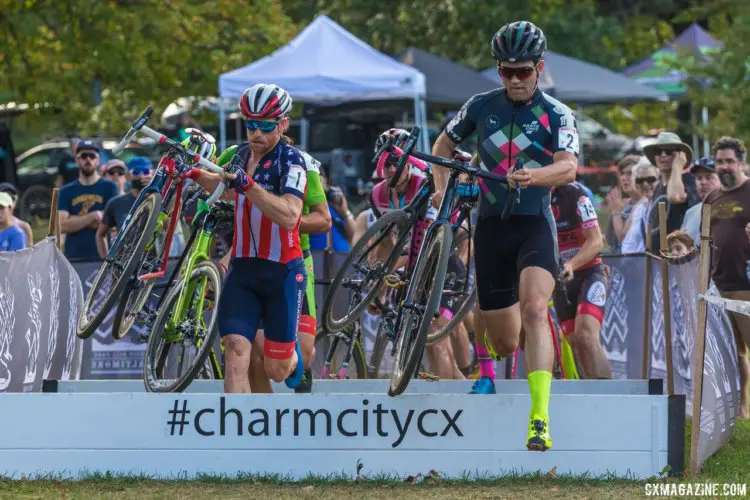
Competition has been tight in the Men’s fields so far this season. 2017 Charm City Cross Day 1 © M. Colton / Cyclocross Magazine
After several years of having one or two dominant domestic men riders, we were curious if the first month of the season is a sign of an ultra-competitive domestic season leading up to U.S. Nationals in Reno. We reached out to some of the riders in the thick of things and two era-spanning legends for their thoughts on the first month of the 2017/18 season.
Stay tuned for a look at the Women’s field during the next few weeks.
Any Given Saturday or Sunday
One could argue the last several years have been dominated by one or two riders in the Men’s field. In a way, the 2014 Nationals in Boulder were the end of an era where any number of riders, including Jeremy Powers, Tim Johnson, Ryan Trebon, Jonathan Page, Zach McDonald, Todd Wells and others, could win on any given Saturday or Sunday.
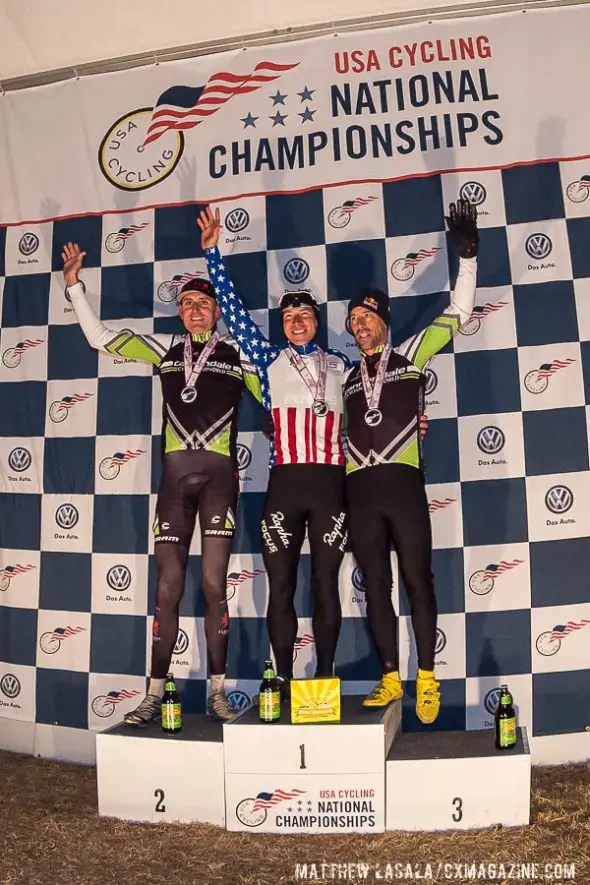
In a way, the 2014 Nationals were the end of an era. Powers, Trebon and Johnson stand on the podium in Boulder. © Matt Lasala
The 2014 and 2015 seasons belonged to Jeremy Powers, who won 20 of the 23 domestic races he entered. The heart of the 2016 domestic calendar was headed up by Stephen Hyde, who won seven of eight races from the KMC Cross Fest through Derby City and then went on to win Nationals in Hartford.
This season, Hyde, Kerry Werner, Tobin Ortenblad, Anthony Clark and Lance Haidet have all won domestic UCI races and Jeremy Powers finished on the podium behind the Sweeck brothers at CrossVegas.
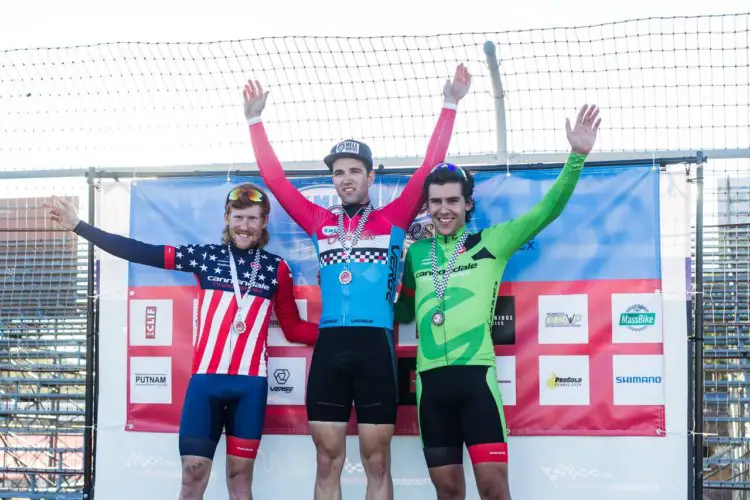
A number of riders have been podium threats so far this season. 2017 KMC Cross Fest Day 2. © Jake Orness
We were curious what the riders involved think and what role they think the courses, the heat, the Europeans, the US Cup-CX series and other factors have played in the results this season.
We spoke with Hyde, Werner and Ortenblad to get their thoughts.
The three agreed the talent we have seen in the results is not a fluke. “We have more good riders right now in the men’s field than we have in a long while,” said Hyde. “I am happy for that, for sure. I think it will raise all of our collective levels of racing.”
Oretenblad agreed, “Thus far our racing has been pretty interesting. There’s been some new players at the front of the Elite races and the way the races have been playing out has been a bit more aggressive.” He continued, “I like that anybody can win any given race so I’m starting every race with an all-in, committed attitude.”
After a podium finish in Hartford and win in Rochester, Werner is certainly part of that fraternity of excellence. “For me being at the front of the race consistently this year has been different,” he said about his early-season success. “I take the fact that I am there with pride but I don’t run away with it. These other guys that are at the front are just as strong as me if not stronger on any given day so I have to keep my wits about me in order to have it at the end when it matters.”
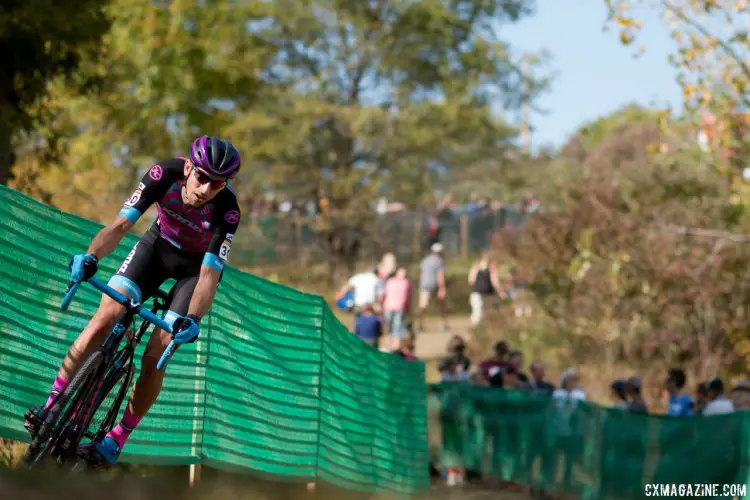
Kerry Werner has consistently been at the front of races this season. 2017 Jingle Cross World Cup, Elite Men. © A. Yee / Cyclocross Magazine
The Course, Of Course
The courses at Rochester and KMC Cross produced several races that came down to sprint finishes or groups of several riders riding together well into the final lap. Have these contributed to the parity in the results?
Werner said the courses have favored a certain kind of rider. “I would think that riders coming from a road background would be more used to thinking while riding,” he said. “The racing lends itself to skills like planning what’s ahead, whether it is worth it to attack or sit in, and staying at the front of the group so that you are there for the decisive moments.”
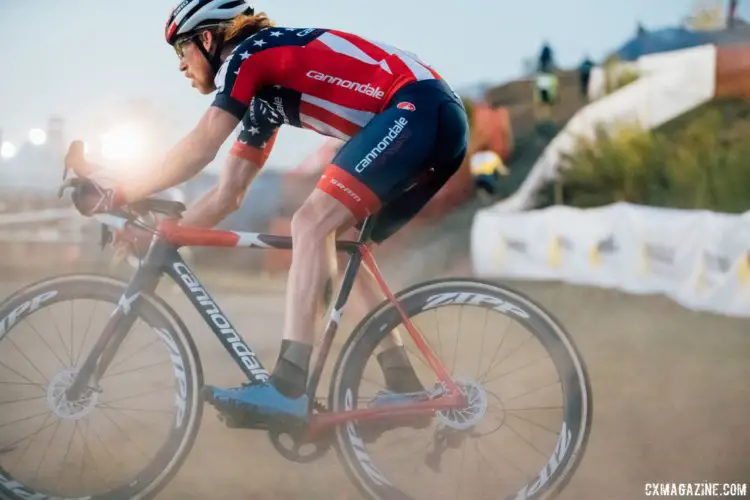
The KMC Cross Fest produced fast, dusty conditions. 2017 KMC Cross Fest Day 1 (Friday) © J. Curtes / Cyclocross Magazine
Ortendblad agreed but added the early-season races often favor those with the best fitness. “Although both Rochester and KMC had groups at the front, I’d say KMC was an easier course because of the large amounts of pavement and overall width of the course,” he said. “The early racing always seems to favor the riders coming into the season with fitness since we don’t have any inclement weather to mix it up.”
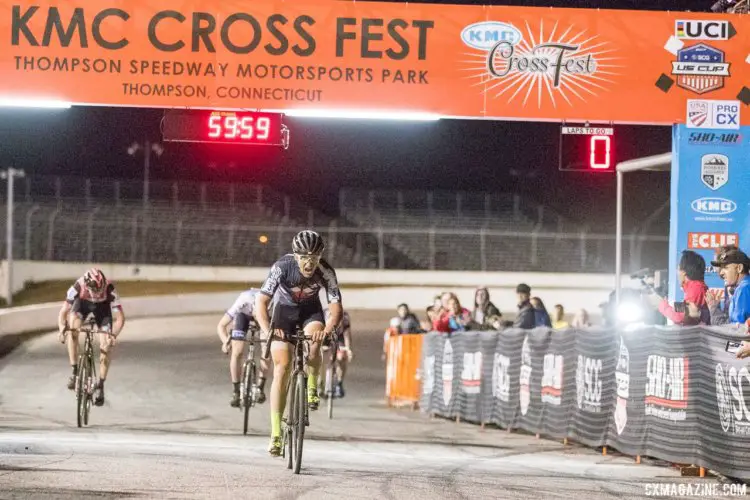
Tobin Ortenblad (Santa Cruz / Donkey Label Racing) took the win Friday night. 2017 KMC Cross Fest Day 1 (Friday) © J. Curtes / Cyclocross Magazine
Hyde said the courses have created different racing than professional riders often see. “Both races outside of the World Cup weekends have been heavily contested by U.S. riders but were also [have been] very fast paced and non-traditional cyclocross courses,” he said. “So we see the divide between skill levels get narrowed and tactics become more of a major player. Something we didn’t see a lot of in the past.”
Ortenblad races some road during the cyclocross offseason, Hyde has done a mix of both, but Werner is primarily a mountain biker. What does he think of the races thus far? “Coming from a mountain bike background all I want to do is put my head down and let my fitness and bike skills do the talking,” he said. Werner continued, “Deep down I yearn for some mud, ruts and bike-driving skills influencing the front of the race.”
Back to the Future?
Anytime you are looking at a specific era of cyclocross, it helps to have a historical perspective for context. We reached out to two riders in Jonathan Page and Todd Wells who share seven U.S. cyclocross national championships between the two of them and are still able to race with today’s top riders. The two each looked to different eras for a comparison.
For Wells, it was the early 2010s. “Yes, I would say domestically it is similar to the pre J-Pow run of the past few years where you always had a handful of guys with a real shot of winning on any given day,” he said.
He added he thinks it is good for the sport. “In my opinion, it makes it more exciting for the fans and the racers. If the same guy wins all the time the riders stop believing they have a chance to win and almost give up before the start. It keeps it exciting and everyone mentally in the game.”
Page went back a little further to the late 1990s. “My last year as a junior and first years as a U23,” he said. “The Frank and Mark McCormack, Bart Bowen, Gullickson era. But back then, there was only one race venue per weekend and there were some weekends in between with no races. All the best racers were at each race weekend offered.”
A while back we highlighted an awesome video of the Saturn Supercup series that showcased just how much parity the race series had, and is certainly worth a watch to see what Page is referencing.
Page spoke of the late 1990s, when there was usually only one UCI race per weekend in the U.S. He said the best riders benefit from racing against each other each weekend. “Here in the U.S. now, there are multiple UCI venues each weekend so “parity at the top” isn’t really parity at the top,” he said “Instead, it is “parity at the top of each venue.” I think when one person dominates in a season, it gets boring. However, I don’t think it’s good for U.S. ’cross on a world level to have so many racers potentially able to win races at the multiple venues every weekend.”
Wells agreed that competitive racing is better for everyone. “It’s hard for the guys that are always good because it means there more competition but it pushes everyone to be better,” he said. “When you fight all the way to finish it’s a lot harder then if you’re on cruise control off the front. It makes it more exciting for the fans as well.”
Wells also said he enjoys a tough battle to this day, even if he does not always come out on top. Said Wells, “For me, it was always more fun to have a great fight all the way to the finish though it was much more comfortable to be out front on cruise control. Overall more competition makes everyone better and helps push people to their limits and set new ones. I think it’s great.”
Chasing the Cup
One new wrinkle that has thrown into the domestic ’cross scene is the seven-race US Cup-CX series that will award $10,000 to the top man and woman. Many of the country’s top racers, especially those on the East Coast, lined up at the KMC Cross Fest and appear to be vying for the prize.
For years, commentators have said U.S. cyclocross needs a series to help provide focus for the domestic calendar. After the first weekend, has the new series affected the racing?
Werner said he already thinks it has had a positive impact. “It is noticeable how people are drawn to following a series and the fight for the top step,” he said. “Now I have this mentality of really focusing hard on these races and going in with a winning attitude, more so than when they were just races on the calendar. Even if I don’t win it will be an achievement to say I was second or third because you know everyone wanted it just as bad. ”
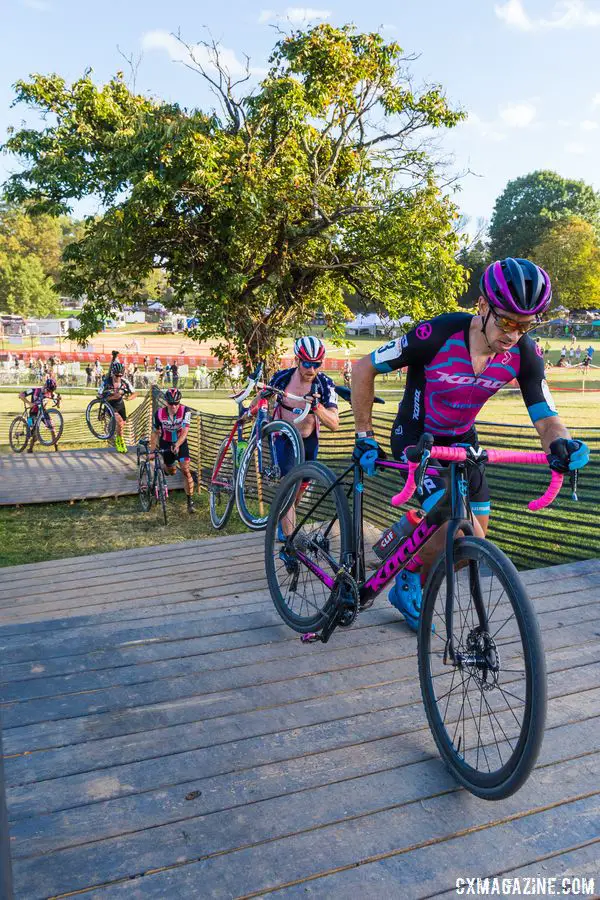
Werner said the series has already influenced the racing. 2017 Charm City Cross Day 1 © M. Colton / Cyclocross Magazine
Hyde echoed similar sentiments. “I am excited that so many riders are so close after the first weekend,” said the ginger star. “It keeps nerves high and raises the stakes. Some tensions are good and I believe this will raise the level of competition throughout the season. We have something to fight for right now and I think that’s good for all of us.”
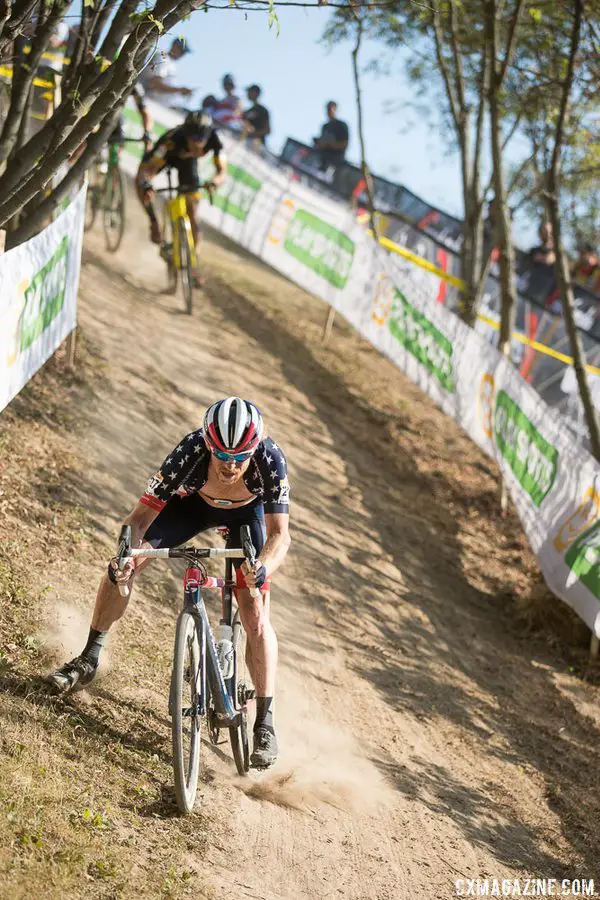
Hyde said he thinks the US Cup-CX has been good for competition. 2017 World Cup Waterloo © J. Curtes / Cyclocross Magazine
Ortenblad had a bigger picture perspective on the series. “What they have done is created a points series that sponsors, friends, fans, and family can follow,” he said. “This is important for the progression of our sport. There’s something tangible for those people to follow since most aren’t checking the UCI rankings every Tuesday.”
Who are the Pros Eyeing Up?
Although it is just the beginning of October, we it is never too early to start thinking about Nationals, right? We asked the trio of riders to make way-too-early predictions for Reno.
Always the good teammate, Hyde mentioned his teammate in green. “I haven’t seen the course and the race is 3.5 months away,” he said “We still have a long way to go and these guys are hungry for wins now. We also have a few riders in the Elite field that were under 23 last year, Curtis White for example. He has a long season ahead of him but it’s not out of the picture with the level of support and talent he has. Of course, he will have the same fight from me as any anyone else!”
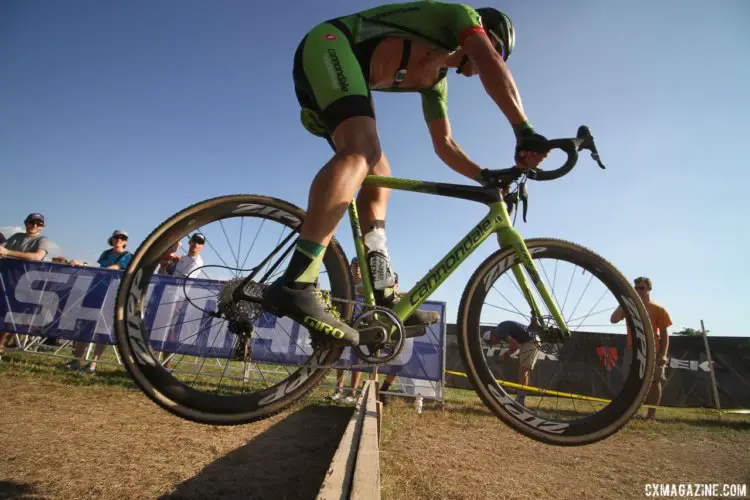
Curtis White is a rider to watch this season. 2017 World Cup Waterloo Elite Men. © D. Mable / Cyclocross Magazine
Werner said it will likely come down to hairstyle. “Well after the first couple weekends, just by results, it seems Tobin and Stephen are the ones to watch,” he said “I would favor Stephen in January because the weather will likely not aid in having a dry course. By no stretch am I saying Tobin can’t ride in the mud, but Stephen has a mullet. I don’t see how Tobin can compete with Ginger Joe Dirt.”
And finally, for Ortenblad, it comes down to baby power. “Pick for Nationals? Powers. Why? Daddy watts.”
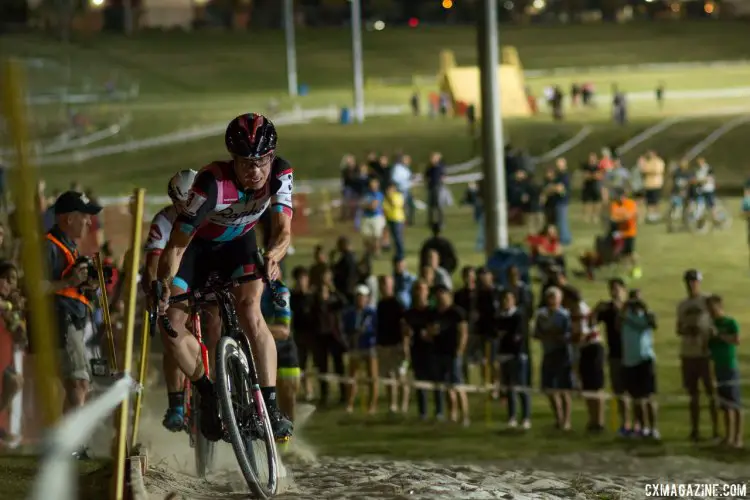
Ortenblad went with Jeremy Powers’ daddy watts. 2017 CrossVegas Elite Men. © A. Yee / Cyclocross Magazine
Stay tuned to Cyclocross Magazine for coverage of the domestic racing scene through Nationals in Reno.


